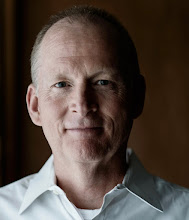 The following is an excerpt from a new book I've just finished reading called Unleashing The Power of Rubber Bands. The book's author is Nancy Ortberg.
The following is an excerpt from a new book I've just finished reading called Unleashing The Power of Rubber Bands. The book's author is Nancy Ortberg.One day I was in a meeting of senior leaders at Willow Creek Church, and a co-worker named Greg Hawkins was talking very excitedly. He was talking about this topic of development and he pulled a thick rubber band out of his pocket. He stretched it between his two hands and said, "Very simply"-Greg is a genius when it comes to making complex issues simple, and therefore, doable-"this is development."
He showed what happened when he moved his hands too far away from each other: The rubber band became taut and clearly in danger of breaking. Stretched too far for too long, the rubber band is ruined.
Then he moved his hand closer together until the rubber band became slack, not at all capable of doing what we hire rubber bands to do-completely incapable of acting like a decent rubber band.
Inherent in the leadership relationship is the expectation that over time, the direction you give will result in progress toward maturity, growth in skills and character, and even an increase in your own leadership competencies. I think it is a helpful and good discipline to write out a simple development plan for the people you lead. And once that plan is written, the best way to implement it is to think of those people as rubber bands."
The core of leadership is hope. Leadership is the hope that we can change the things that need to be changed, and create what we cannot now imagine. Hope gives us the courage to move forward, the power to forgive, and the grace to keep the promises we have made. Hope dispels fears. Hope readies us for round two...Hope redeems mistakes and prompts the optimism and resilience of a leader.
To lead well, we must possess the strong belief that our best days are ahead of us, always ahead of us. Yes, hope and leadership are inexorably linked.
It doesn't take long to realize that leadership is hard. You should be able to conjure up the names of at least five people who make that a true statement. All kinds of things make leadership difficult, but certain people are one of those things.
As the picture of those certain people comes to mind, take a minute to let that picture fade. Because of all the difficult people you will lead, the hardest person to lead will be yourself. Call it whatever you want-the discipline of a leader, self-leadership, managing yourself-you've got your work cut out for you.
The journey of leadership is as much inward as it is outward. Leadership, done well, will continually be a force that drives you back into the center of yourself to find out what you are really made of. Great leadership occurs when you understand your own motives, your ‘dark side,' what you want to misrepresent in order to look better than you really are.
One of the things I believe deeply is this: Leaders ought to be the most self-aware people in the room. Sure, who doesn't agree with that? Especially if I clarify that I am not talking about a narcissistic self-awareness. You know the kind: The people who know only two pronouns: I and me-no, not that kind of self-awareness.
I'm talking about the kind of self-awareness that makes you comfortable in your own skin. You know who you are and who you aren't. You lean into and lead out of your strengths. You have words for your brokenness, and while you may wish you had none, you know that you do, and you know what they are. And you know that other people know. You wouldn't have it any other way.

